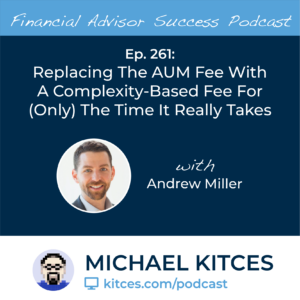 Welcome back to the 261st episode of the Financial Advisor Success Podcast!
Welcome back to the 261st episode of the Financial Advisor Success Podcast!
My guest on today’s podcast is Andrew Miller. Andrew is the founder of OLIO, a financial planning firm based out of McLean, Virginia, that manages $275 million for over 275 households.
What’s unique about Andrew, though, is how he’s been able to craft a scalable business model based on complexity fees, by meticulously capturing the details of every planning analysis he’s done for his clients over the years and translating it into a clear estimate of the time and effort it will take to handle any new client’s planning needs.
In this episode, we talk in depth about how Andrew developed his time-based system to determine how to price his services to clients, why Andrew’s focus on time has led the firm to do less and less investment work for clients and more and more for clients’ other financial planning needs (because as Andrew notes, if your technology stack is good enough, it really does take about the same amount of time to rebalance a $100,000 account as it does to rebalance a $9M account), and the financial planning proposal process that Andrew created to help translate the value of his time into dollar amounts that make his fee worthwhile to the clients he serves.
We also talk about how financial advice given to Andrew developed a skepticism of the financial industry that ultimately helped shape his career and OLIO’s financial planning process, how Andrew’s experience as a civil engineer fostered an understanding of how time and productivity are intertwined (which helped him create the tools that are applied to OLIO’s fee structure), and how Andrew is positioning himself and his firm to be successful as technology encroaches ever further into the realm of financial planning.
And be certain to listen to the end, where Andrew describes how his own financial planning philosophy and ‘money scripts’ began at an early age, how fostering the education of resident advisors means so much to him and his vision for the future of the financial planning industry, and how despite being told by other advisors that his business model would ‘never work’ that it’s been his willingness to create his own definition of success that’s allowed him to achieve it.
So whether you’re interested in learning about how Andrew’s own experience with financial advice and fees inspired him to promote change from within the financial advice industry, how Andrew employed his civil engineering background to create time-based data to determine his fee model, or how Andrew is helping to shape the future by coaching and educating resident advisors, then we hope you enjoy this episode of the Financial Advisor Success podcast, with Andrew Miller.
Leave a Reply